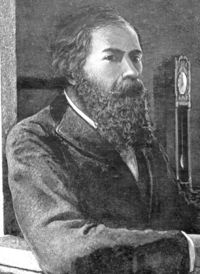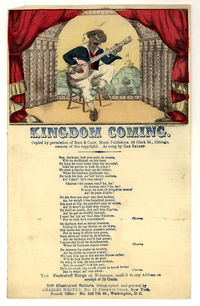Annotation:Year of Jubilo: Difference between revisions
No edit summary |
No edit summary |
||
| Line 1: | Line 1: | ||
== | __NOABC__ | ||
<div class="noprint"> | |||
<p><font face="sans-serif" size="4"> Back to [[{{BASEPAGENAME}}]] </font></p> | |||
</div> | |||
---- | ---- | ||
<p><font face="sans-serif" size=" | {{#lst:{{PAGENAME}}|abc}} | ||
---- | |||
<div style="page-break-before:always"></div> | |||
<p><font face="sans-serif" size="3"> | |||
<div style="text-align:justify;"> | |||
{{break}} | |||
'''YEAR OF (THE) JUBILO.''' AKA and see "[[Massa's Gone Away]]," “[[Old Master's Runaway]].” AKA – “[[Doodletown Fifer (2) (The)]],” “[[Jublio]],” “[[Jubiller]],” “[[Kingdom Coming]]," "[[Lincoln's Gunboats]].” American, March; New England, March or Polka (2/4 time). USA, widely known. G Major (Brody): C Major (Person): D Major (Messer, Miller & Perron, Phillips). Standard tuning (fiddle). AABB. "Year of Jubilo" or "Kingdom Coming" [http://en.wikipedia.org/wiki/Kingdom_Coming] was an American stage and blackface minstrel song whose words and tune were written by New England abolitionist Henry Clay Work [http://en.wikipedia.org/wiki/Henry_Clay_Work] in 1862. The song tells of the effect of freedom for slaves after their Master had evacuated his Plantation in advance of Union forces. The composer took his title from the biblical story that ancient Hebrews declared a "Jubilee Year" every half century in which all the slaves were freed. Work also composed such songs as the Civil War "[[Marching Through Georgia]]," "[[My Grandfather's Clock]]," and the music for "[[Wreck of the Old 97 (The)]]." His lyric begins: | '''YEAR OF (THE) JUBILO.''' AKA and see "[[Massa's Gone Away]]," “[[Old Master's Runaway]].” AKA – “[[Doodletown Fifer (2) (The)]],” “[[Jublio]],” “[[Jubiller]],” “[[Kingdom Coming]]," "[[Lincoln's Gunboats]].” American, March; New England, March or Polka (2/4 time). USA, widely known. G Major (Brody): C Major (Person): D Major (Messer, Miller & Perron, Phillips). Standard tuning (fiddle). AABB. "Year of Jubilo" or "Kingdom Coming" [http://en.wikipedia.org/wiki/Kingdom_Coming] was an American stage and blackface minstrel song whose words and tune were written by New England abolitionist Henry Clay Work [http://en.wikipedia.org/wiki/Henry_Clay_Work] in 1862. The song tells of the effect of freedom for slaves after their Master had evacuated his Plantation in advance of Union forces. The composer took his title from the biblical story that ancient Hebrews declared a "Jubilee Year" every half century in which all the slaves were freed. Work also composed such songs as the Civil War "[[Marching Through Georgia]]," "[[My Grandfather's Clock]]," and the music for "[[Wreck of the Old 97 (The)]]." His lyric begins: | ||
</font></p> | </font></p> | ||
| Line 22: | Line 30: | ||
''An’ de year Jubilo!''<br> | ''An’ de year Jubilo!''<br> | ||
</i></font></blockquote> | </i></font></blockquote> | ||
<p><font face="sans-serif" size=" | {{break|2}} | ||
< | </div> | ||
''Source for notated version'': Hollow Rock String Band (N.C.) [Brody]. | </font></p> | ||
<div class="noprint"> | |||
<p><font face="sans-serif" size="3"> '''Additional notes''' </font></p> | |||
<p><font face="sans-serif" size="3"> | |||
<font color=red>''Source for notated version''</font>: - Hollow Rock String Band (N.C.) [Brody]. | |||
{{break|2}} | |||
</font></p> | </font></p> | ||
<p><font face="sans-serif" size=" | <p><font face="sans-serif" size="3"> | ||
''Printed sources'': Brody ('''Fiddler’s Fakebook'''), 1983; p. 294. Ford ('''Traditional Music in America'''), 1940; pp. 69 & 339. Messer ('''Original Old Tyme Music by Don Messer & His Islanders'''), 1942. Messer ('''Anthology of Favorite Fiddle Tunes'''), 1980; No. 7, p. 8. Miller & Perron ('''101 Polkas'''), 1978; No. 58. Ostling ('''Music of '76'''), 1939; No. 13. Mrs. Joe Person ('''A Collection of Popular Airs'''), 1889; p. 13. Phillips ('''Traditional American Fiddle Tunes, vol. 2'''), 1995; p. 357. | <font color=red>''Printed sources''</font> : - Brody ('''Fiddler’s Fakebook'''), 1983; p. 294. Ford ('''Traditional Music in America'''), 1940; pp. 69 & 339. Messer ('''Original Old Tyme Music by Don Messer & His Islanders'''), 1942. Messer ('''Anthology of Favorite Fiddle Tunes'''), 1980; No. 7, p. 8. Miller & Perron ('''101 Polkas'''), 1978; No. 58. Ostling ('''Music of '76'''), 1939; No. 13. Mrs. Joe Person ('''A Collection of Popular Airs'''), 1889; p. 13. Phillips ('''Traditional American Fiddle Tunes, vol. 2'''), 1995; p. 357. | ||
{{break|2}} | |||
</font></p> | </font></p> | ||
<p><font face="sans-serif" size=" | <p><font face="sans-serif" size="3"> | ||
''Recorded sources'': | <font color=red>''Recorded sources'': </font> <font color=teal> -Flying Fish FF009, Red Clay Ramblers – "Stolen Love." | ||
<font color=teal> | |||
Flying Fish FF009, Red Clay Ramblers – "Stolen Love." | |||
Folk Legacy FSI-74, Howard Bursen – "Cider in the Kitchen" (1980). | Folk Legacy FSI-74, Howard Bursen – "Cider in the Kitchen" (1980). | ||
Fretless 122, Ken Bonner – "Old Time Fiddling 1976" (appears as "Jubiller"). | Fretless 122, Ken Bonner – "Old Time Fiddling 1976" (appears as "Jubiller"). | ||
| Line 42: | Line 50: | ||
</font> | </font> | ||
</font></p> | </font></p> | ||
{{break}} | |||
---- | ---- | ||
== | <p><font face="sans-serif" size="4"> Back to [[{{BASEPAGENAME}}]] </font></p> | ||
</div> | |||
__NOEDITSECTION__ | |||
__NOTITLE__ | |||
Revision as of 03:51, 10 August 2019
X:1 T:Untitled T:Kingdom Coming M:2/4 L:1/8 R:Polka S:Anonymous 1862 American music manuscript collection (p. 15) N:https://archive.org/stream/MerryMen/MUMSS-00079#page/n0/mode/2up Z:AK/Fiddler’s Companion K:D A|DF FA|Af f/e/d/B/|Ad dF|E3 A| DF FA|Af f/e/d/B/|Ad e>f|d zd:| a|b>b bd'|a>b a/g/f/g/|ad'd'f|e3 a| df fa|Af f/e/d/B/|Ad dF|E3 a| b>c' d'b|d'3b|a>b af|a3 a| df fa|Af f/e/d/B/|Ad e>f|d2 z||
YEAR OF (THE) JUBILO. AKA and see "Massa's Gone Away," “Old Master's Runaway.” AKA – “Doodletown Fifer (2) (The),” “Jublio,” “Jubiller,” “Kingdom Coming," "Lincoln's Gunboats.” American, March; New England, March or Polka (2/4 time). USA, widely known. G Major (Brody): C Major (Person): D Major (Messer, Miller & Perron, Phillips). Standard tuning (fiddle). AABB. "Year of Jubilo" or "Kingdom Coming" [1] was an American stage and blackface minstrel song whose words and tune were written by New England abolitionist Henry Clay Work [2] in 1862. The song tells of the effect of freedom for slaves after their Master had evacuated his Plantation in advance of Union forces. The composer took his title from the biblical story that ancient Hebrews declared a "Jubilee Year" every half century in which all the slaves were freed. Work also composed such songs as the Civil War "Marching Through Georgia," "My Grandfather's Clock," and the music for "Wreck of the Old 97 (The)." His lyric begins:


Say, darkeys, hab you seen de massa,
Wid de muffstash on his face,
Go long de road some time dis morning’,
Like he gwine to leab de place?
He seen a smoke way up de ribber,
Whar de Linkum gunboats lay;
He took his hat, an’ let’ berry sudden,
An’ I spec’ he’s run away!
Chorus:
De massa run? ha, ha!
De darkey stay? ho, ho!
It mus, be now de kingdom comin’
An’ de year Jubilo!
